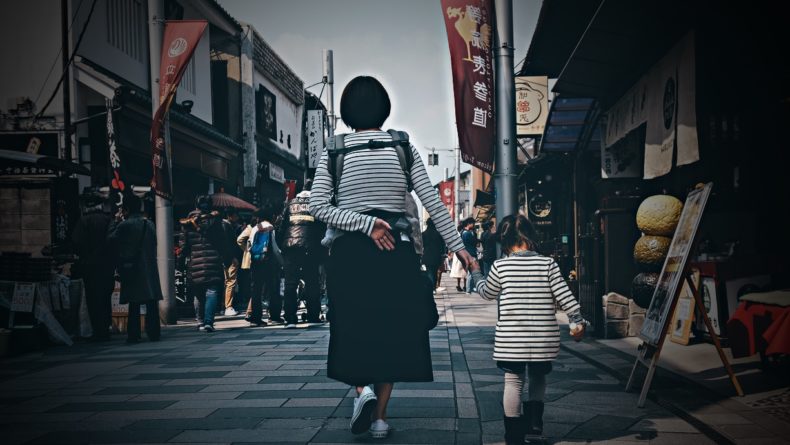Ladies & The Law: The 1968 Patricide Case That Paved The Road Toward Equality In Japan
Japanese court cases where women have made a difference
Savvy Tokyo's new series “Ladies And The Law” dig back in time tracing the catalysts for changes in Japanese laws that directly or indirectly affect women and their families. In each of these court cases, you will find a story, at times shocking, at times uncomfortable to discuss, and at times painful to read. But in all cases, there has been a woman whose trial has caused a change for many other women in Japan. If you have a topic you would like us to cover through a real court case, contact us at editorial@gplusmedia.com
On the night of October 5, 1968, CA murdered her father at their apartment in Tochigi prefecture.
At the time CA was 29 years old and unmarried. Her father had first raped her when she was 14 and over the ensuing 15 years she had borne him five children and had six abortions. At her doctor’s suggestion (and her father’s approval), she was sterilized after the sixth abortion. Two of CA’s infants died shortly after birth. The other three, all daughters, were shown on her father’s family registry as his “illegitimate” children, since his wife, CA’s mother, had divorced him and taken their other children away when she realized what was going on.
In spite of this situation, CA had met a man at her workplace who wanted to marry her. When her father learned of this, he had locked her in the house and abused her in various ways for a period of 10 days. On the 10th day, when he grabbed for her in a drunken state, she fought him off, managed to overpower him, and strangled him.
These salacious facts have never been in doubt. A murder was committed. And both the law and society expect the murderer to pay. The question was what an appropriate penalty would be given the circumstances.
The charges against her
The prosecutor charged CA under Article 200 of Japan’s Criminal Code, which at that time provided that patricide — regarded as the equivalent of treason against the state — must be punished with death or life in prison.
But was it appropriate in a case such as this to impose such a harsh penalty? It is worth noting that Article 199 of the Criminal Code provides for lighter penalties, as little as three years in prison, for murder in non-parental situations. It wasn’t until CA’s case was appealed to the Supreme Court of Japan that the question was finally resolved.
Just a little over two decades earlier, Japan had adopted its post-war constitution, which included Article 14: “All of the people are equal under the law and there shall be no discrimination in political, economic or social relations because of race, creed, sex, social status or family origin.” The basic principle was that the government should not treat any person as above or below any other person based on traits they were born with.
Her father had first raped her when she was 14 and over the ensuing 15 years she had borne him five children and had six abortions.
CA’s lawyers argued that imposing a harsher penalty based on the identity of the murder victim — punishing a child for murdering her parent more harshly than the law would punish a parent for murdering his child — violated this constitutional principle of equality.
Shortly after promulgation of the post-war constitution, criminal defense lawyers had used the same argument in another patricide case and been rebuffed by the Supreme Court, which upheld the constitutionality of the criminal code provision, ruling that Article 14 of the Constitution was merely stating a general principle, while the Criminal Code contained “appropriate concrete provisions as dictated by morality, justice or suitability for purposes.” Even in this earlier case, three of the 15 justices filed strong dissenting opinions.
The road to the Supreme Court
The trial court in Utsunomiya accepted CA’s argument and suggested that CA should have been charged under Criminal Code Article 199 or another similar provision. The prosecutor did not accept this judgment and instead appealed the case to the Tokyo High Court, which upheld the prosecutor’s position.
Needless to say, CA appealed this decision to the Supreme Court of Japan. Because of the constitutional argument being presented, the case was heard by all 15 justices (the “Grand Bench”).
The final judgment
Perhaps it was the compelling facts of CA’s tragic circumstances (even in a time before Japanese society acknowledged that domestic violence existed in this country). Perhaps it was simply that after 20+ years the Supreme Court had become more accustomed to the new constitution and therefore more robust in their analysis of its parameters. It’s impossible to say exactly why, but the Supreme Court not only overruled its earlier decision, it actually went so far as to hold that Article 200 of the Criminal Code violated the constitution and was therefore invalid. This is the only time in history that the Supreme Court of Japan has invalidated a statutory provision.
The basic principle was that the government should not treat any person as above or below any other person based on traits they were born with.
Of course, CA had taken a human life and admitted that she had done so. The extenuating circumstances are not enough, in the Japanese legal system, to allow her to simply walk free. So the Supreme Court instead determined that Article 199 of the Criminal Code should be applied and sentenced her to two and a half years in prison. It then suspended the sentence.
As a side note, the Supreme Court issued a notice to the Ministry of Justice that it had ruled Article 200 to be unconstitutional. Nonetheless, the law remained on the books for another two decades, until a major revision of the Criminal Code was undertaken. It is significant, however, that after CA, no one was ever prosecuted under Article 200 again.
The social implications
The Supreme Court decision was handed down nearly five years after the murder. During those five years, CA had endured arrest, exoneration in her first trial, conviction on appeal, and the final appeal to the Supreme Court. And this following 15 years of abuse by her father. Most people would agree, she had been punished enough.
Article 200 of the Criminal Code violated the constitution.
Through everything that CA endured, in the end, she stands for a very fundamental legal principle: equality under the law. Maybe in the course of Japan’s legal development, it took a woman to convince the courts of the importance of this principle.
Recent news stories, including the medical university admissions discrimination, make it clear that women have not yet achieved full equality in the eyes of some segments of Japanese society. Change is incremental in this country. This Supreme Court decision was merely one small step.
Vicki L. Beyer is a Professor of Law at the Hitotsubashi University Graduate School of Law Business Law Department.
In Part II of the “Ladies And The Law” series, we will look into an infamous 1980s trial of hostile workplace sexual harassment that changed the way the problem was legally viewed in Japan.














Leave a Reply